Loughinisland, Press Freedom and the NYE
A Letter to the Editor from TIM HICKS, the Enquirer’s police and crime correspondent, reorting some relief in the persecution of investigative journalists by authorities who are the subject of their investigations. Ring any bells?
~~~~~
Dear Sir,
I am writing to thank you for publishing my article on World Press Freedom Day:
NYE Article: World Press Freedom Day Friday 3 May 2019
In the article, I also raised the case of investigative journalists Trevor Birney and Barry McCaffrey pictured above with David Davis MP.
Briefly, on the 18th of June 1994 terrorists walked into The Heights Bar in the small rural village of Loughinisland, County Down, Northern Ireland and fired on the customers, killing six civilians and wounding five. They attacked the pub because it was mainly used by Catholics and was crowded with people in a compact mass who were watching Ireland v Italy in the 1994 World Cup. No one was charged with any offence.
What became known as the Loughinisland Massacre was investigated in the documentary “No stone unturned” which Trevor and Barry were involved in. It can be viewed here. Other than stating that so far as I can ascertain none of the victims had any connections to any paramilitary or terrorist organisation, I will pass no comment on it. I prefer to give our readers the opportunity to watch it and draw their own conclusions.
In the World Press Freedom Day article, I commented as follows:
On the 31st of 31 August 2018 two Belfast-based investigative journalists and NUJ members, Trevor Birney and Barry McCaffrey, were arrested in connection with the alleged theft of a confidential report from the office of the Police Ombudsman for Northern Ireland. The leaked unredacted report was sent to the journalists by an anonymous source (McCaffrey received a plain envelope in the post with no return address).
The document relates to the first police investigation into the killing of six men in Loughinisland, Northern Ireland in 1994 and the document features in the film No Stone Unturned.
This award-winning documentary tells the story of the victims and their families. It also examines the police investigation into the murders – for which no one has yet been charged. Furthermore, the film names the murder suspects and highlights allegations of collusion between the police and the gunmen.
When Trevor Birney and Barry McCaffrey were arrested, they were questioned for 14 hours and their homes and office were raided by the police. The journalists remain on pre-charge bail and must report back to the PSNI in September 2019 (by which time they will have been on bail for more than a year).
Trevor and Barry have won permission to challenge the legality of the search warrants and the High Court in Belfast has granted a judicial review.
Original statement on the arrests under the Official Secrets Act from Durham Constabulary website dated the 31st of August 2018 here.
The operation was codenamed Operation Yurta. The Gold Commander was the Chief Constable of Durham Constabulary Mike Barton who remains accountable to the Chief Constable of the PSNI and the Northern Ireland Policing Board. The Silver commander was the Senior Investigating Officer for the investigation who was Darren Ellis from Durham Constabulary.
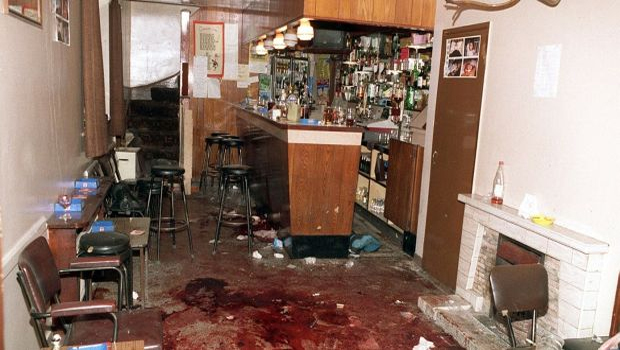
The blood soaked floor of The Heights Bar after the murders.
I am delighted to report that the challenge to the legality of the search warrants was successful. High Court judges ruled that search warrants issued against the men were “inappropriate” and they recommended the return of the material, under agreed terms and conditions.
The NUJ welcomed the decision by the High Court in Belfast to quash the warrants for members Trevor Birney and Barry McCaffrey. In his introduction in court, the Chief Justice said the two journalists were acting in “nothing other than a perfectly appropriately way in doing what the NUJ required of them, which was to protect their sources.” NUJ reaction here.
Following the outcome of the challenge on the 3rd of June – predictably – Durham Constabulary abandoned the prosecution of the two journalists. Trevor and Barry were released from police bail the next day and collected their possessions from the PSNI. Guardian report here.
In short, the PSNI and Durham Constabulary were defeated in Court and publicly humiliated, by journalists.
Here I speculate, but I suggest the reason for this rapid about face and the decision to abandon any prosecution was that Durham Constabulary and the PSNI both concluded that:
- Should the cases go to court, the trial would bring a level of public scrutiny to the original police investigation and the reasons for prosecuting, that neither could withstand.
- The prosecutions had no realistic chance of success and that on acquittal, both forces would face even more severe judicial criticism than they had received thus far.
- An acquittal would set a precedent that would severely restrict future prosecutions of journalists.
- An acquittal would intensify calls for the case to be re-opened, including an enquiry into the conduct of the original murder investigation.
Both journalists were strongly supported by the NUJ, other journalists (including the NYE), civil liberties organisations and parliamentarians throughout.
Public Comment
The PSNI released this statement from Chief Constable George Hamilton on the closure of the case against Trevor and Barry dated 4 June 2019:
“In 2017, PSNI became aware of an alleged theft and/or unlawful leaking of sensitive documents relating to the Loughinisland Investigation from the Office of the Police Ombudsman. To ensure independence and address any conflict of interest I asked Durham Constabulary to conduct the investigation.
I am grateful to Durham Constabulary and to Chief Constable Mike Barton for the work they have conducted on our behalf in this sensitive investigation. I have always accepted the autonomy of Chief Constable Barton’s inquiry and I fully concur with his decision not to progress the investigation into the two journalists Mr Birney and Mr McCaffery (or the two individuals arrested in November 2018.)
Throughout the period of this investigation, the horror of what happened in Loughinisland has never been far from any of our thoughts. The perpetrators of that crime have never been brought to justice and that is a matter of huge regret for policing.
The police investigation into who murdered the six innocent men in the Heights Bar in 1994 remains open but progress is dependent on new information. There are people out there who know what happened. I would appeal to them to come forward and make a statement that will help us finally bring justice to the families of the victims.
I am aware that the investigation over the last year has caused concern for families who have already suffered so much. That is something none of us would ever have wished to do.
However, as a police service, the suspected theft or unlawful leaking of any sensitive documents containing information that may endanger life is a serious matter which we are statutorily obliged to investigate.
Recognising the sensitivities, we asked an independent Police Service to conduct the investigation. The clarity provided by last week’s hearing has now brought a significant part of that investigation to a conclusion.
I await the final report from Durham on this complex investigation.”
The statement is remarkable for not making any reference to the police collusion that prevented the failure to bring the killers to justice, or for any expression of regret for the distress both journalists and their families suffered. Or for the disruption to their lives and careers caused by having to put them on hold for a year while they dealt with the charges, the loss of their liberty and unjustifiable arrest. Nor does it make any apology for the misuse of police time and taxpayers funds expended on this farcical exercise.
Chief Constable Mike Barton also refused to apologise to Trevor and Barry. He is quoted on the case in this BBC Report and his reported remarks justifying restrictions being placed on the freedom of the press to investigate police misconduct mirror those of Chief Constable Hamilton:
“I absolutely respect press freedom, but I do not – in my view and I have been corrected by the lord chief justice – I do not think it appropriate that secret documents that put people’s lives at risk are put out there in the public domain – I think those discretions should be fettered.”
This comprehensive article for the NUJ by Séamus Dooley covers the case in a particularly balanced way and puts the other side of the story very well. A few quotes:
“No evidence of criminality was ever produced by the police,”
During the hearing, “retired British police office Darren Ellis had been called in by the PSNI to investigate the alleged theft of documents. In his notebook Ellis expressed concern that lives had been “put in danger for merely having the misfortune of being involved in terrorist atrocities at whatever level”. There were incredulous gasps when McDonald quoted that passage.”
“Why did the PSNI and Durham Constabulary, appointed to carry out an investigation into police failures, not make an appointment to meet Trevor Birney and Barry McCaffrey, with their legal representatives if necessary?”
“It’s a matter of record that the police were aware in advance of the film. ….the Police Ombudsman of Northern Ireland was aware of the content and took part in panel discussion on the film on its release.”
“In the High Court the Lord Chief Justice upheld the right of investigative journalists to ask awkward questions, to go where the authorities have failed to go and to hold to account those in whom trust has been shattered.”
It should be said that had the original Loughinisland investigation been competently and impartially conducted, the journalists would never have had to release the documents into the public domain. Satirically paraphrasing both chief constables’ statements above:
“As a police service, when journalists publish documents received from a whistleblower containing information that proves collusion between the police and racist terrorists, which causes embarrassment to the police, it is a serious matter.
We will crack down on them hard, by asserting the release of the documents was a theft which endangered the lives of people who were terrorists that had the misfortune to have planned and executed a racist mass murder. Then use this to punish journalists for revealing the truth and embarrassing the police.
This show of force will ensure journalists never dare do this again, so police incompetence and corruption will carry on being unreported and unpunished.”
Senior Conservative MP David Davis (pictured above outside the court) supported the two journalists throughout. Following the quashing of the search warrants, Mr Davis was kind enough to release this press statement to the NYE:
Last week, David Davis MP attended the final hearing of the case involving two journalists, Barry McCaffrey and Trevor Birney, as they fought against attempts to undermine the freedom of the press.
Over the course of the past few years, Barry McCaffrey and Trevor Birney have worked on No Stone Unturned, a documentary into the 1994 Loughinisland Massacre. In doing so, they received an un-redacted copy of the Police Ombudsman for Northern Ireland’s report into the Massacre. No Stone Unturned, using this information, went on to name a member of the Ulster Volunteer Force as one of those guilty for the murders.
A few months before the release of the documentary, both Barry and Trevor had their lives upturned. The Police Service of Northern Ireland arrested the pair in front of their families and ransacked their belongings. Armed officers seized both professional and personal possessions, including documents related to their work on Loughinisland.
The journalists were accused of the theft of “secret” documents from the offices of the Police Ombudsman for Northern Ireland. They were charged with handling stolen goods, the theft of documents and breaching the Official Secrets Act.
Barry McCaffrey and Trevor Birney brought judicial review proceedings in order to have the warrants declared unlawful.
On Tuesday 28th of May, Lord Chief Justice Sir Declan Morgan, sitting in the High Court in Belfast, quashed the warrants used to search Barry and Trevor’s houses. On Friday, it was decided that all material seized during these searches should be immediately returned to them.
Summing up, Lord Chief Justice Morgan said the journalists had “acted in a perfectly proper and legal way to protect sources” and that the search warrants were “inappropriate”.
Following the trial David Davis MP said:
“This is a huge victory, both for Barry and Trevor as well as for the most fundamental keystone of modern-day free society – that of the freedom of the press.
A truly free press must be able to expose uncomfortable truths, highlight underperforming governmental departments and be a nuisance to the establishment.
Journalists must be able to investigate, probe and expose issues of legitimate public concern. This is precisely what Barry and Trevor were doing, and it is why the police were so keen to silence them.
If our press is unable to do this, then society will suffer for it. Being subject to constant fear of arrest or establishment misconduct will undermine the necessary freedom of the press, and lead to worse things besides.
It has been an honour to support both Barry McCaffrey and Trevor Birney in Belfast this week.”
ENDS
Where now for the investigation into the Loughinisland massacre?
Needless to say, whilst the journalists that exposed the Loughinisland scandal were arrested. None of the terrorists -or the corrupt police officers that colluded with them- have been prosecuted and there are no plans to re-open the case.
When the news that Trevor and Barry had been released from police bail was released, Mr Davis issued this statement on his website David Davis MP writes on the importance of press freedom following the Loughinisland case. It addresses two issues
The case
“The case was chilling. Has it succeeded it would have blighted investigative journalism across the UK.”
“Surely, no-one can argue that revealing the truth behind the Loughinisland massacre is not in the public interest? Particularly since the Police Ombudsman had said that some members of the police force were guilty of ‘collusion’. The PSNI took the opposite view.”
“The verdict in this case represents a huge victory, not only for the journalists involved, but also for press freedom – the most fundamental cornerstone of modern-day society.”
“A truly free press must be able to expose uncomfortable truths and that includes being a nuisance to the establishment. Journalists must be free to investigate, probe and expose issues of public concern without fear or favour.”
“This is precisely what No Stone Unturned sought to do and it is presumably why the police were so keen to silence those behind the documentary.”
The need to re-open the Loughinisland investigation and bring the murderers to book
“The proper end to this sorry situation would be for the PSNI to fully reopen the Loughinisland case.”
“The unavoidable conclusion of No Stone Unturned is that there was a large quantity of clear evidence available at the time and the identities of the murderers are widely known.”
“It is difficult to believe that a viable case could not now be brought to court, and give justice and closure to the people of Loughinisland.”
Implications for the NYE
Trevor and Barry’s investigation was an excellent piece of journalism. It has increased the credibility of cold case investigations performed by journalists holding public bodies to account. Inevitably this must include those conducted by community journalists like the NYE.
The outcome of the case vindicates the NYE’s editorial policy of supporting Trevor and Barry by covering their case in the NYE and working with the NUJ, parliamentarians, civil libertarians and other journalists to keep their case in the public eye. Mr David Davis MP stated that he was proud to have supported Trevor and Barry. So is the NYE.
Trevor and Barry have accomplished a very successful cold case investigation, which has increased the media profile of this atrocity, revealed police corruption and also improved the chances of a successful prosecution being mounted against at least three of the persons that were involved in the murders. This must be in the public interest.
It seems to me that the outcome of this case is very relevant to the treatment the NYE has received from the public bodies it scrutinises. Particularly Scarborough Borough Council (SBC), the Office of the Police Fire and Crime Commissioner for North Yorkshire and of course North Yorkshire Police (NYP). There are also some uncanny and highly relevant similarities as follows:
- In “No Stone Unturned” it is alleged that one of the three men that committed the murders was a police informant and the RUC covered up the crime to protect him. It has been further alleged that this led ultimately to the decision to arrest Barry and Trevor for revealing this. Similar issues have faced the NYE. NYP are still refusing to confirm or deny if serial rapist and child abuser Peter Jaconelli was a paid police informant for Scarborough CID.
- Trevor and Barry’s work revealed that the Loughinisland investigation had been completely compromised by police incompetence and corruption. In all the NYE’s cold case investigations (Jimmy Savile, Peter Jaconelli, Peter Sutcliffe antecedent investigations including the North Yorkshire “Harrogate Ripper” and “Nude in the Nettles” cases, and the Christopher Halliwell antecedent investigations) we also have found police incompetence. In some we have identified varying degrees of police misconduct or corruption.
- In the Loughinisland case, the police destroyed the getaway car, so it is no longer available for forensic exploitation using techniques not available in 1994. All the interview notes were also destroyed on the basis that they may have been “contaminated with asbestos”. In the Peter Jaconelli and Jimmy Savile cases, all of the intelligence had disappeared.
- Like Trevor and Barry, the NYE has also suffered retaliation from public bodies. Our exposure of police collusion with the Peter Jaconelli and Jimmy Savile paedophile ring, and other cases of police misconduct in NYP has I believe earned its eternal enmity. Peter Jaconelli was a leading Conservative politician, Councillor and Mayor of Scarborough, so our exposure of him has also brought down the wrath of Scarborough Conservatives on the NYE. NYE journalists have faced attempts to prosecute them for harassment by both SBC and NYP. When I was interrogated at Fulford Road Police Station York for five hours by two of the most experienced detectives in NYP as part of Operation Rome, one of them accused me of damaging North Yorkshire Police as if this was a crime and confirmed that the Chair of the Police Authority (former County Councillor Jane Kenyon) had spoken to him about my case. Normally a harassment investigation would be led by a Uniform Branch Constable, but this one was led by no less a person than the Deputy Chief Constable. Media comment here and here. Again I quote Mr Davis “Being subject to constant fear of arrest or establishment misconduct will undermine the necessary freedom of the press, and lead to worse things besides.”
- As Mr Davis points out, “Journalists must be able to investigate, probe and expose issues of legitimate public concern”. To be effective journalists must be “able to expose uncomfortable truths, highlight underperforming governmental departments and be a nuisance to the establishment”. I am sure that Deputy Chief Constable Tim Madgwick, Chief Constable Winward (NYP), Police Fire and Crime Commissioner Julia Mulligan Councillor Derek Bastiman (SBC) and others would all agree that the NYE achieves this and is a nuisance. Indeed Councillor Bastiman has alleged that our stated aim is to cause nuisance to the council and he has used this to justify all NYE contributors being blacklisted and refusing to respond to Freedom of Information requests and correspondence from them. Chief Constable Lisa Winward instituted a policy of refusing to respond to correspondence from me on her first day in office. This policy was subsequently followed by the Police Fire and Crime Commissioner for North Yorkshire Julia Mulligan. Blatant examples of public servants retaliating against journalists, for putting the public bodies they lead under legitimate scrutiny, which has revealed misconduct and/or serious failings.
- The NUJ has also been very supportive of the NYE, as it was with Trevor and Barry. It has written to Chief Constable Winward raising its concerns over the aggressive media policy she is currently pursuing towards the NYE.
- In the Loughinisland case it is alleged that the PSNI abused police powers to criminalise journalists, in order to a) punish them for embarrassing the police and to b) deter other journalists from enquiring into things the PSNI would prefer remained secret. I assert that NYP has indulged in the same tactics. When I started to probe into misconduct in NYP I was told to report to a police station in North Yorkshire to be arrested for harassment. When I reported to Fulford Road Police Station in York, I was not arrested, I was questioned about an article I had written which revealed that Chief Constable Grahaem Maxwell and Deputy Chief Constable Adam Briggs had received £100,000 in fraudulent training allowances. At the end of the interrogation, the detective interrogating me gave me a letter from Detective Superintendent Heather Pearson demanding that every article I had written about NYP was taken down from the internet on the grounds that NYP had determined that they were “misleading”. (Subsequently NYP conceded that my article was accurate BBC article here). Immediately after the interrogation, my solicitor wrote to the police and told them there was obviously no case to answer and the CPS subsequently refused to charge me. Then I received an official letter from Chief Constable Tim Madgwick threatening me with arrest and civil proceedings if I continued to comment on NYP Operations and Business.
On the 20th of September 2019 the PSNI confirmed in response to a Freedom of Information Act Request that the cost to the taxpayer of the investigation into Trevor and Barry so far have been £247,874.42 and that this is “an ongoing investigation and costs will be still incurred and further invoices submitted”. I have also submitted a FOI request to SBC asking it to reveal the costs of the threatened legal action against “The Real Whitby Four” (myself, Tim Thorne, Nigel Ward and Glenn Kilpatrick). Needless to say, SBC did not respond and demonstrated considerably less public accountability than the PSNI. North Yorkshire Police finally responded to a freedom of information request having withheld a response since February 2017 and I can now confirm that the costs to the North Yorkshire taxpayer were £386,347 for police time spent on Operation Rome and £236,393.86 in legal fees for Operation Hyson. I hope this was a very expensive lesson for Mrs Mulligan and NYP. Sadly, it is also an expensive lesson for the taxpayers of North Yorkshire.
Trevor and Barry’s case is indicative of a trend by public bodies to attack critics. I believe that publicly exposing the costs of this type of flawed action will deter public bodies from expending unlimited sums of public money on harassing journalists, to meet the political and public relations objectives of politicians and Chief Police Officers.
Chief Constable Winward, Police Fire & Crime Commissioner Julia Mulligan, Councillor Siddons (SBC) the PSNI and Durham Constabulary have received a draft of this article and been given the opportunity to comment.

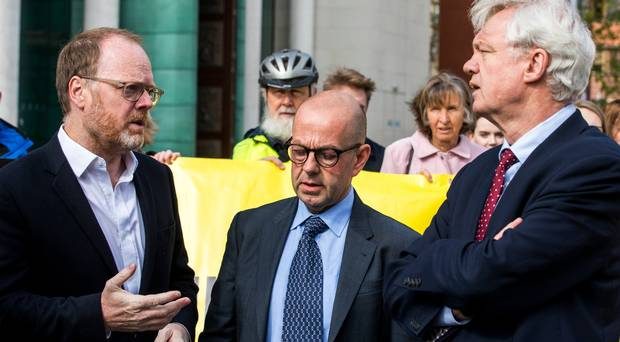
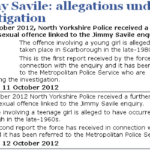
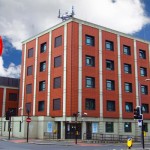
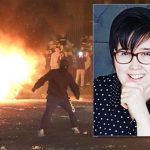
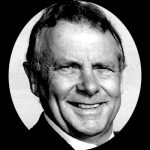

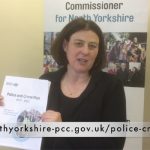
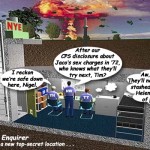
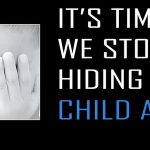
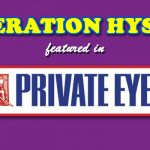
















Comments are closed.